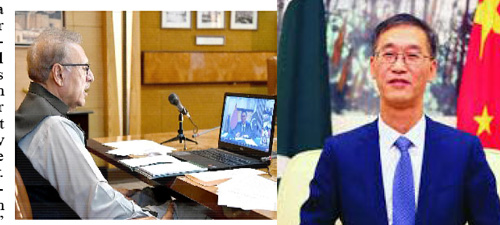STAFF REPORTER IS LAMABAD President Dr Arif Alvi has said that the multifaceted gigantic project of China Pakistan Economic Corridor is neither meant for exploitation nor overburdening Pakistani’s economy, rather it will enable the country to strengthen its economic position. “There has been criticism that it overburdens our economy. I assure the participants that it does not overburden our economy but improve the ability for the people of Pakistan to improve their economy. So it doesn’t overburden,” the president said addressing a webinar on “CPEC and its Impact on the Region” hosted by Karachi Council on Foreign Relations in partnership with Pathfinder Group and Martin Dow Limited. The webinar was also addressed by Chinese Ambassador in Pakistan Yao Jing and Chairman CPEC Authority Lt Gen (Retd) Asim Saleem Bajwa, besides Chairman of Karachi Council on Foreign Relations Ikram Sehgal. The President hoped that the CPEC would generate economic opportunities in all sectors including hotelling, banking, finance, insurance, warehousing, food processing, assembly of appliances which would ultimately create jobs for youth and thus help alleviate poverty. The President told the participants that Pakistan had made lot of progress on CPEC projects which could further expand keeping in view the future needs related to power generation, road and rail infrastructure and fiber optic network to further enhance communications. Meanwhile, addressing the webinar, titled “New Opportunities and Challenges of China-Pakistan Cooperation in the Post-Epidemic Era Zhang Baozhong, chief of China Overseas Ports Holding Company Limited, has said no Pakistani worker has been laid off by the Chinese companies working on the China-Pakistan Economic Corridor, an official of a major Chinese firm working on projects in Gwadar told a webinar in Islamabad on Thursday today. Zhang said that neither did any Pakistani employee in any CPEC project lose their job during the coronavirus pandemic nor seen any cut in salary. “All of the CPEC projects are free of Covid-19,” he added. The Pakistan-China Institute cohosted a virtual meeting of government officials, entrepreneurs, and experts to discuss the post-coronavirus pandemic relationship between the two friendly nations in light of the ChinaPakistan Economic Corridor. Key note speaker, Ambassador Yao Jing said he had been personally witnessing the cooperation between the two countries since the start of the coronavirus outbreak. Pakistan’s assistance to China in February, when China was facing Covid-19 crisis, and President Alvi’s visit to China expressed Pakistan’s solidarity with China, he said. Pakistan is the first country with whom China would share vaccine development research information, he added. While talking about the CPEC, he said almost 13,000 Chinese technicians, engineers, and experts were working on related projects, which collectively employed over 60,000 Pakistanis. He also mentioned the Chinese assistance to Pakistan in the wake of Covid crisis, which is worth $15 million. While speaking about opportunities arising from the Covid-19 crisis, he said that the time had come to reset priorities, focusing on human security, human development, better hospital care, and climate change. In this regard, the BRI could be taken as a guiding tool to reach the combined goal of a shared future.The balance of power, according to him, was shifting from the West towards the East. The Asian countries have contained the virus more effectively than Western countries. PCI Executive Director Mustafa Hyder Sayed termed the recent shift in Iran’s policy in regards to the CPEC a good omen for regional connectivity. He also talked about the need for developing the skills of labour working on Special Economic Zones and the role that the private sector should play in the BRI’s development. Chinese experience in developing SEZs could help the Pakistani SEZs succeed









